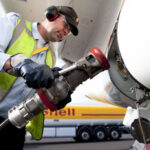The European Commission and EU consumer authorities have written to 20 European airlines notifying them of potentially misleading green claims being made over carbon offsetting or through the use of sustainable aviation fuels. The issue was raised after a complaint by BEUC, an umbrella group of European consumer organisations, which initially identified 17 airlines including Air France-KLM, Lufthansa Group airlines, Finnair, TAP, Norwegian and large low-cost carriers such as Ryanair and Wizz Air. The airlines have been “invited” to respond within 30 days and to bring their marketing practices in line with EU consumer law. The Commission and the network of Consumer Protection Cooperation (CPC) authorities accuse airlines of misleading consumers by informing them that the CO2 emissions caused by a flight could be offset by climate projects or through the use of SAF, to which they could contribute by paying additional fees.
“If we want responsible consumers, we need to provide them with accurate information. More and more travellers care about their environmental footprint and choose products and services with better environmental performance,” said Vĕra Jourová, the Commission’s Vice-President for Values and Transparency. “They deserve accurate and scientific answers, not vague or false claims. The Commission is fully committed to empowering consumers in the green transition and fighting greenwashing. We expect airlines, as well as any other industry operator, to make a responsible use of environmental claims.”
The Commission and CPC authorities say they have identified six types of what they consider are misleading practices among the airlines involved:
• Creating the false impression that CO2 emissions of a flight can be reduced or fully counterbalanced by paying an additional fee to finance climate projects with less certain environmental impact or the use of alternative aviation fuels;
• Using the term ‘sustainable aviation fuels’ without clearly justifying the environmental impact;
• Using the terms ‘green’, ‘sustainable’ or ‘responsible’ in an absolute way or use other implicit green claims that can mislead consumers on the environmental impact of the “highly polluting” aviation industry;
• Claiming that the airline is moving towards net zero greenhouse gas emissions or any future environmental performance without clear and verifiable commitments, targets and an independent monitoring system;
• Presenting consumers with a calculator for the CO2 emissions of a specific flight without providing sufficient scientific proof on whether such calculation is reliable and information regarding the elements used for the calculation; and
• Presenting consumers with a comparison of flights as regards their CO2 emissions without providing sufficient and accurate information on the elements of the comparison.
“This action aims at aligning the commercial practices of all companies in the air travel sector with EU consumer legislation, by attaining the required level of substantiation and communication of voluntary environmental claims,” say the consumer authorities, which coordinate their investigation and enforcement actions with the Commission. Under the Consumer Protection Cooperation Regulation, they can take action to address cross-border issues at EU level.
Consumer protection against misleading green claims can also be found in the Directive on empowering consumers for the green transition, which the Commission says explicitly bans claims, based on the offsetting of GHG emissions, that a product has a neutral, reduced or positive impact on the environment in terms of GHG emissions, as well as claims based on future environmental performance.
In this airline greenwashing action, the CPC authorities are lead by the Belgian Directorate General for Economic Inspection, the Netherlands Authority for Consumers and Markets, the Norwegian Consumer Authority and the Spanish Directorate General of Consumer Affairs.
After receiving replies from the airlines written to, the Commission says it will organise meetings with them and the CPC network to discuss solutions, with the Commission then monitoring the implementation of the agreed-upon changes.
“If the airlines involved do not take the necessary steps to solve concerns raised in the letter, CPC authorities can decide to take further enforcement actions, including sanctions,” warns the Commission.
Brussels-based BEUC, which launched the initial complaint in June 2023, is the umbrella group for 45 independent consumer organisations from 31 European countries.
“It is great news that authorities from across Europe acknowledge consumers have been fooled by airlines’ greenwashing,” commented Monique Goyens, BEUC’s Director General. “It is unacceptable that airlines have freely lured consumers into offsetting their flight’s emissions, sometimes at a high price. One can never be sure that the trees planted to compensate a flight’s high emissions will capture the carbon back into the ground – if they are planted at all.
“The fact that European consumer protection authorities are calling on airlines to get their act together shows there’s a wind of change. Greenwashing is no longer acceptable, and the fact that aviation is one of the most highly polluting sectors makes it even more intolerable. This crack-down on greenwashing is encouraging at a time when consumers are expected to shift to more sustainable lifestyles.”
Responding to the action, a statement by Airlines for Europe (A4E) said that although proposed EU legislation on green claims aimed to establish a clear legal framework for sustainability communications across all sectors, the current regulations varied significantly between countries and were still evolving.
“We recognise the importance of clear, transparent information about sustainability and our efforts towards achieving net zero carbon emissions. This clarity benefits consumers, regulators, fuel suppliers, NGOs and other key stakeholders involved in our transition,” it said. “A4E is engaged in ongoing discussions fostered by EU bodies to develop a common methodology for airlines to effectively communicate our sustainability efforts and progress.”
The trade body said it had already outlined an independently-produced roadmap to achieving net zero, with many airlines’ interim targets verified by SBTi. It added that it was, however, “particularly concerned” over the complaint concerning sustainable aviation fuels and the requirement for a clear justification of their environmental impact. “The EU has implemented an ambitious SAF mandate, supported and endorsed by the European Commission, and the science supports that this is a more sustainable alternative to regular jet fuel.”
The Commission has not named the 20 airlines it has written to, although BEUC listed 17 in its submission: Air Baltic, Air Dolomiti, Air France, Austrian, Brussels Airlines, Eurowings, Finnair, KLM, Lufthansa, Norwegian, Ryanair, SAS, SWISS, TAP, Volotea, Vueling and Wizz Air.
Following a greenwashing lawsuit brought by German environmental group Deutsche Umwelthilfe in March, the Cologne Regional Court found against Eurowings on claims that passengers could neutralise their flight emissions through paying a small sum towards forestry protection and cookstove projects. That same month, a group of environmental NGOs similarly won a lawsuit against KLM in a Dutch court after alleging the airline’s sustainability marketing breached the EU Unfair Commercial Practices Directive.
Photo: Brussels Airport














More News & Features
New studies confirm minor flight re-routing to avoid contrails would have major climate benefits
EU SAF mandates will have to be revised, predicts French oil chief
Swiss advanced SAF technology startups Metafuels and Synhelion reach project milestones
EU states to mobilise 500 million euro support for early-mover eSAF production startups
European Commission announces Sustainable Transport Investment Plan to advance low-and-no-carbon fuels
Catagen launches SAF production company and signs offtakes with Ryanair and Shell